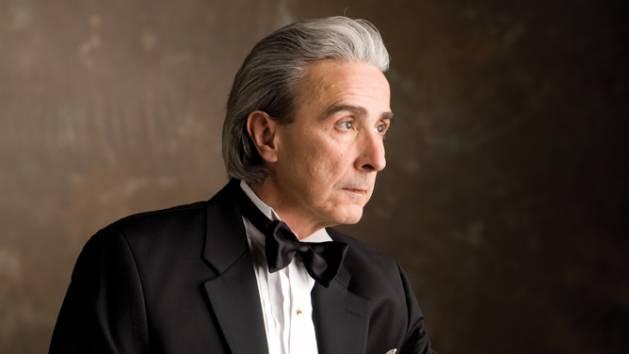Rodriguez, Frost Symphony Orchestra open music season with a Russian storm

Santiago Rodriguez performed Prokofiev’s Piano Concerto No. 3 with the Frost Symphony Orchestra Saturday night at Gusman Concert Hall.
A pianistic thunderbolt ignited the Frost Symphony Orchestra’s opening concert of the season as Santiago Rodriguez launched into Prokofiev’s Piano Concerto No. 3 with unbridled abandon Saturday night at the University of Miami’s Gusman Concert Hall.
Many performances of this most-played of the five Prokofiev keyboard concertos are technically impressive but move at a low emotional temperature. Not so with Rodriguez. From the rapid-fire runs of the piano’s entrance, Rodriguez brought remarkable excitement to Prokofiev’s tour de force. When familiar musical themes and phrases sound as new as this, the performer has achieved something special.
A Cliburn Competition Silver Medalist and Frost faculty member, Rodriguez has not been heard in solo performances locally in recent seasons and his return is more than welcome. He may have set the record for the fastest performance of the concerto’s first movement and the pianist kept up the relentless, headlong pace up to the movement’s final bars. Even with that unflagging momentum, every note was cleanly stated and the angular passages were never blurred. For all his power and speed, Rodriguez brought a sensitive touch to the more songful moments, imbuing the second theme with a wide color palette.
In the theme and variations of the second movement, the piano’s initial statement of the principal melody sounded almost nocturnal in Rodriguez’s hands. Even the darting patterns that followed emerged rhapsodic and playful and the quirky turns in the variations were given real character. In the Allegro finale, Rodriguez captured the primitive Russian rhythms with sweep and power. There was a nice sense of contrast in the central episode, assayed with svelte lightness. The buildup of tension in the final section was riveting. Guest conductor Mark Gorenstein drew splendid playing from the ensemble, finely coordinating tempo and phrasing with Rodriguez’s individualistic performance.
A vociferous ovation from an audience that included many Frost students, faculty members and administrators brought an unusually generous concertante encore—the complete second movement of Rachmaninoff’s Piano Concerto No. 1. Here Rodriguez switched gears, shaping the romantic melodies in a spacious and eloquent fashion. His large span of dynamics ranged from softly caressing to large and voluminous.
Gorenstein, conductor of Russia’s Novosibirsk Symphony and former director of the State Symphony of Russia, is a practiced hand with the symphonies of Dmitri Shostakovich and his reading of the Symphony No. 1 in F minor captured the whimsy and boldness of this 1925 creation by the 19-year-old composer. This symphony put Shostakovich on the international musical map, with its brash style and striking thematic invention.
Yet the performance took a while to gather heat, with rhythms in the first movement square and stodgy. Gorenstein built the big climaxes impressively, however, and captured the wildness of Shostakovich’s satirical gallop in the second movement, where the strings played with high precision.
Even at this early stage of his creative career, Shostakovich’s slow movements were memorable for their soulful darkness. The third movement Largo is the score’s heart and Gorenstein brought out the searing bleakness of the movement’s long-limbed themes. The strings sounded lustrous and full with exceptional solos by concertmaster Charles Hardt and principal cellist Ian Flatt. At one point, Gorenstein brought the violins down to a barely audible whisper, a considerable achievement in the live Gusman acoustic.
The Russian conductor had the orchestra firing on all cylinders in the finale. The playing of the student orchestra was fully on a professional level with ensemble unanimity and especially fine oboe, horn and trumpet solos that highlighted this first major opus by one of the 20th century’s most distinctive creative voices.
Thomas Sleeper conducts the Frost Symphony Orchestra in the world premiere of Dorothy Hindman’s Setting Century, Roberto Sierra’s Sinfonia No. 3, Sibelius’ Finlandia and Beethoven’s Symphony No. 7 at 8 p.m. October 15 at UM Gusman Concert Hall.
Santiago Rodriguez plays a solo recital 8 p.m. October 31 at UM Gusman Hall. The program will feature Thomas Sleeper’s Marina, Ginastera’s American Preludes and Piano Sonata No. 2, and Rachmaninoff’s Piano Sonata No. 2 and selections from his Preludes, Études-tableaux and Moments-musicaux. music.miami.edu
Posted in Performances
One Response to “Rodriguez, Frost Symphony Orchestra open music season with a Russian storm”
Leave a Comment
Sun Sep 18, 2016
at 1:05 pm
1 Comment
Posted Sep 19, 2016 at 6:56 pm by James Murphy
A magical night to remember. I will be there on Ovt. 31st.